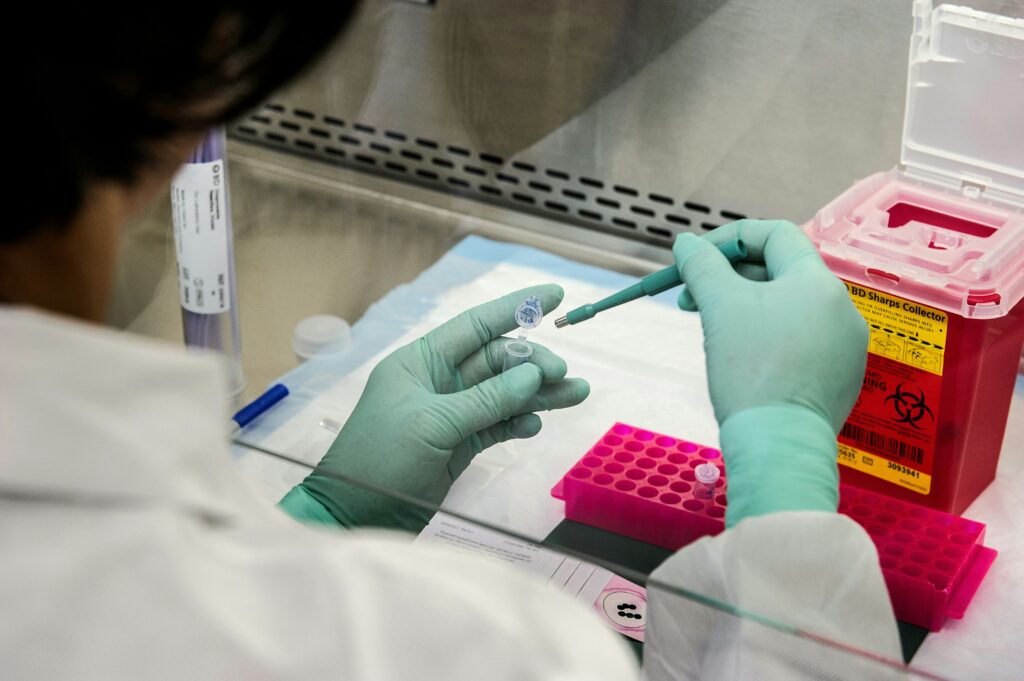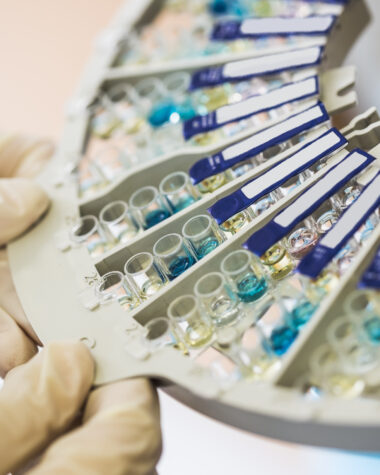BridgeBio Pharma Inc. (NASDAQ:BBIO) is a commercial-stage biopharmaceutical company founded with the mission of identifying, developing, and delivering innovative medicines for patients living with genetic diseases and genetically driven cancers. Headquartered in Palo Alto, California, the company was established to address the significant unmet needs of rare and serious conditions through a model that combines cutting-edge scientific discovery with a streamlined development approach. Since its inception, BridgeBio has positioned itself as a company focused on translating genetic insights into therapeutic breakthroughs that can reach patients more quickly and efficiently than traditional biotech pathways.
The foundation of BridgeBio lies in its ability to pair deep expertise in genetics with a portfolio approach to drug development. Instead of relying on a single program or therapeutic area, the company was designed to operate like a platform, advancing multiple programs simultaneously across both early and late stages of development. Its strategy has been to pursue rare diseases and genetically defined conditions where the underlying biology is well understood, allowing for a more targeted and rational drug design. This approach has helped BridgeBio build one of the most diverse pipelines in the biotech sector, covering neurology, cardiology, oncology, endocrinology, and dermatology, among others.
A key element of BridgeBio’s evolution has been its ability to move programs rapidly from academic discovery into clinical development. By partnering with leading academic institutions and leveraging external scientific expertise, the company has established collaborations that strengthen its pipeline and expand its reach into underexplored areas of medicine. This academic-to-industry model has been critical in enabling BridgeBio to identify promising drug candidates early and accelerate their advancement toward regulatory milestones.
One of the most important milestones for BridgeBio has been the development and launch of Attruby, its treatment for transthyretin amyloid cardiomyopathy (ATTR-CM). Attruby has positioned the company as a commercial-stage biotech with a product generating meaningful revenue while also validating its broader business model. In addition to ATTR-CM, BridgeBio continues to advance late-stage programs in conditions such as achondroplasia and other rare skeletal dysplasias, as well as oncology indications where genetic drivers are clearly established. Each of these programs underscores the company’s strategy of focusing on diseases with strong genetic underpinnings, where the probability of clinical success may be higher due to well-characterized biology.
BridgeBio’s management team, led by founder and CEO Neil Kumar, Ph.D., brings together a blend of scientific, clinical, and commercial expertise. The leadership has consistently emphasized not just the science, but also the importance of building a sustainable business model that can deliver medicines while managing the risks inherent to biotech. Over the years, the company has raised significant capital, entered into partnerships, and established itself as a prominent player in the rare disease space. Its commercial progress, coupled with its deep pipeline, has made it a closely watched company within both the biotech industry and the broader financial markets.
Despite the risks common to biotech, BridgeBio has cultivated a reputation for pursuing bold science with the potential to change the trajectory of devastating genetic diseases. Its diversified portfolio, academic collaborations, and focus on genetically driven conditions highlight the company’s distinctive strategy in an increasingly competitive landscape. BridgeBio continues to present itself as an organization committed to bridging the gap between groundbreaking genetic discoveries and the patients who need them most.
Insider Selling Erodes Investor Confidence
Insider selling is often viewed as a subtle warning sign, and in BridgeBio’s case, the optics have not been favorable. In August 2025, Chief Financial Officer and President Thomas Trimarchi sold approximately US$2.1 million worth of shares at an average price of US$49.48. While this represented only 9.1% of his overall holdings, the timing and magnitude still raise eyebrows. More concerning was the larger transaction earlier in the year, when Independent Director Wen-Chaun Lo sold US$3.8 million worth of stock at US$38.50 per share. What unsettles investors is not only the scale of these sales but the fact that they occurred at prices below current trading levels, implying that insiders were satisfied with valuations significantly lower than today’s. Even more telling, over the past year, there has been no evidence of insider buying. For a company that promotes its long-term growth story, the absence of insider accumulation combined with regular sales may suggest limited conviction in near-term upside.

CHECK THIS OUT: Exact Sciences (EXAS) Just Made Cancer Detection 100x Easier! and Soleno Therapeutics (SLNO): The Biotech Company That Could Make You Rich.
Insider Ownership is Meaningful, But Not Reassuring
BridgeBio Pharma insiders still collectively own around US$438 million worth of stock, or about 4.7% of the company. While such ownership can often align management’s interests with shareholders, the lack of insider purchases despite recent pullbacks dampens that argument. Investors often interpret insider buying as a vote of confidence, particularly during periods of volatility, but BridgeBio’s leadership has not taken that opportunity. Instead, repeated selling patterns, even at modest valuations, could be interpreted as insiders seeking to de-risk their positions rather than doubling down on the company’s growth trajectory.
Soaring Revenues Mask Widening Losses
On the surface, BridgeBio’s revenue trajectory looks like a success story. In Q2 2025, the company reported revenues of $110.6 million, up dramatically from just $2.2 million in the prior year, fueled almost entirely by the commercial ramp-up of Attruby and related royalties. Yet these numbers obscure a much darker trend. Operating expenses surged from $177.7 million to $244.8 million over the same period, driven largely by a nearly $70 million jump in selling, general, and administrative costs tied to commercialization. As a result, the company reported a staggering net loss attributable to common shareholders of $181.9 million in Q2 alone, compared to $73.5 million a year earlier. This trend of rapidly rising costs outpacing revenue growth raises doubts about the sustainability of the current business model.
Attruby Concentration Risk and Royalty Monetization
BridgeBio’s future is becoming increasingly tethered to Attruby’s success. While the therapy has shown early signs of market adoption, the company is already heavily reliant on it for nearly all of its product revenue. In an effort to bolster liquidity, BridgeBio monetized part of its European royalty rights for BEYONTTRA, Attruby’s name abroad, in exchange for a $300 million upfront payment. While this improves short-term funding, it also means BridgeBio has sacrificed future revenue potential for near-term survival. Such moves highlight just how dependent the company has become on Attruby, and how fragile its broader growth story may be if the drug’s performance fails to meet high expectations.
Weak Balance Sheet and Financing Risks
BridgeBio’s losses are stacking up quickly, and without external funding, the company may struggle to sustain its operations. While the $300 million royalty monetization has temporarily strengthened liquidity, the company’s cash burn remains high, and losses over the first half of 2025 totaled $349.3 million. Equity dilution, debt financing, or further asset sales may be required to fund operations and pipeline development. Each of these outcomes could negatively impact shareholders, either through reduced ownership, mounting debt obligations, or a shrinking pipeline of future royalty revenues.
Analyst Downgrades and Bearish Growth Forecasts
Analyst projections, once bullish on BridgeBio’s prospects, are starting to soften. After years of delivering annual growth rates exceeding 35%, consensus now suggests BridgeBio’s growth will fall below the broader biotech sector average. Analysts forecast a decline in growth relative to the industry’s expected 21% annual rate, underscoring doubts about whether the company can maintain momentum. At the same time, valuation multiples remain elevated compared to peers, leaving little margin for error. If Attruby sales disappoint or if pipeline setbacks emerge, BridgeBio’s share price could see sharp downside.
Pipeline Risks Compound the Bearish View
While BridgeBio frequently touts its pipeline breadth, the reality is that drug development remains highly uncertain, with regulatory and clinical risks that could derail future value creation. Any delay in clinical trials, failure to meet primary endpoints, or rejection by regulators would further stress the company’s already fragile financial position. With Attruby carrying the weight of the company’s commercial success, even minor pipeline failures could magnify investor concerns.
Conclusion: Why BridgeBio Pharma May Struggle to Deliver Long-Term Value
BridgeBio Pharma is riding the momentum of a successful launch with Attruby and a compelling narrative around rare disease innovation. But beneath the glossy surface, a storm is brewing. Insider selling, lack of insider buying, widening net losses, reliance on royalty monetization, concentration risk in a single therapy, and sobering analyst forecasts all paint a far more concerning picture. Investors should be aware that while BridgeBio may continue to deliver near-term revenue growth, the underlying risks make its long-term trajectory uncertain.
For risk-averse investors, BridgeBio looks less like a secure growth story and more like a speculative gamble with significant downside potential. Unless the company demonstrates disciplined cost management, diversified revenue streams, and pipeline execution without setbacks, the bearish thesis suggests that BridgeBio’s valuation could come under serious pressure in the quarters ahead.
READ ALSO: Johnson & Johnson (JNJ) can be the Next Trillion-Dollar Stock and Boston Scientific (BSX) Just Signed a $45M Deal—Here’s What It Means for Investors.








